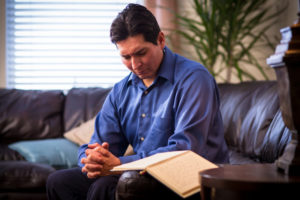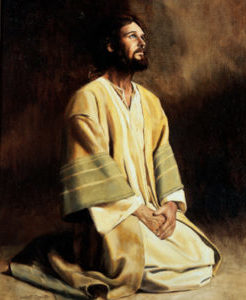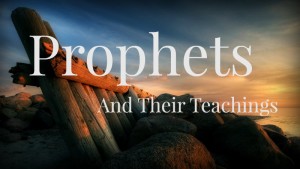Richard G. Scott gave a wonderful talk about the principles of prayer in General Conference. I’m not quite sure how I missed it or what I was doing at the time, but almost three decades later I stumbled across his talk and it now speaks to me. Hopefully my efforts will help his talk speak to you as well.
Erroneous expectations
I remember telling someone at one point in my life, “I know the Lord is aware of me. I know He loves me. He just doesn’t answer my prayers.” I had assumed I was alone in that view on prayer, but Elder Scott’s talk opens with a conversation he had with a woman who was echoing my sentiments exactly!
The assumption drilled in me from childhood had always been that I needed to constantly seek the Lord’s guidance so I could get the answers to my prayers as to what I should be doing step by step throughout my life. It was almost like we are all in a maze with blindfolds on and the Lord wants us to listen to His voice so he can navigate us to the nearest exit. We just have to keep stopping along the way to ask which direction we are supposed to turn next.
Every prayer was supposed to be asked at the moment of need, and once we receive the answer we can move on with our life. Look at what Elder Scott says about how the Lord answers prayers.
It is a mistake to assume that every prayer we offer will be answered immediately. Some prayers require considerable effort on our part. True, sometimes impressions come when we have not specifically sought them. They generally concern something we need to know and are not otherwise able to find out.
 The previous paragraph has some important information in it. First of all, not all prayers are answered while we are on our knees. Elder Bednar has also talked about this in some of his sermons. Some prayers require additional maturing and experience on our part before we are ready for the answer we seek. This means we have to continue to seek the answer, but in the meantime we have to still live our life the best way we know how until we are finally ready for the answer.
The previous paragraph has some important information in it. First of all, not all prayers are answered while we are on our knees. Elder Bednar has also talked about this in some of his sermons. Some prayers require additional maturing and experience on our part before we are ready for the answer we seek. This means we have to continue to seek the answer, but in the meantime we have to still live our life the best way we know how until we are finally ready for the answer.
My mother used to tell me that some gospel ideas or pieces of knowledge that we either stumble upon before we are ready for them or that we want to learn, but aren’t ready for the answer, has to be put, as it were, on a shelf. We store our question where it is safe until the day comes we are ready to take it down and get the answer. I have had some questions that I revisited on occasion for years before I finally got my answer and I could move on to the next question on my “shelf.”
To recap the quote, sometimes the Lord gives us inspiration or revelation completely unsought or unbidden, because we couldn’t have gotten the answer any other way. But there are other times when what we want an answer to requires time on our part before He can give us the answer we seek. We need to learn to have implicit trust that He never ignores, nor does he forget that we have asked the question. The Lord will always answer the questions we ask, but the timing on the answers, as well as the method for the answers is up to Him.
Many of us operate under the assumption that prayers are a one-to-one ratio kind of thing. We ask and He answers. It is viewed sometimes like putting a coin into a vending machine and having a prayer drop into the dispensing box. It doesn’t work that way.
Elder Scott:
We are here on earth to gain experience we can obtain in no other way. We are given the opportunity to grow, to develop, and to gain spiritual maturity. To do that, we must learn to apply truth. How we face challenges and resolve difficult problems is crucially important to our happiness. …
When we explain a problem and a proposed solution, sometimes He answers yes, sometimes no. Often He withholds an answer, not for lack of concern, but because He loves us—perfectly. He wants us to apply truths He has given us. For us to grow, we need to trust our ability to make correct decisions. We need to do what we feel is right. In time, He will answer. He will not fail us.
These paragraphs arrested me in my reading. I had to go back and read them several times before they began to make sense to me. This is what I bring away from what he is saying.
 The scriptures teach us that men are that they might have joy. Joy comes from learning to be like God, our Father. If life is like I originally thought, a maze where I blindly follow directions and don’t make a move unless told to go, then I learn nothing about what it means to bring about much good of my own will. My Father in Heaven wants me (us) to learn how to make decisions, to judge well, to create good on our own. That is how we become like Him.
The scriptures teach us that men are that they might have joy. Joy comes from learning to be like God, our Father. If life is like I originally thought, a maze where I blindly follow directions and don’t make a move unless told to go, then I learn nothing about what it means to bring about much good of my own will. My Father in Heaven wants me (us) to learn how to make decisions, to judge well, to create good on our own. That is how we become like Him.
It is when we face challenges and need to resolve problems that we learn “to apply truth.” When we take our difficulties to the Lord we may get a yes answer or a no answer. We may also get silence. That silence does not mean the Lord is ignoring us or is refusing to answer the question we asked. To requote Elder Scott, “For us to grow, we need to trust our ability to make correct decisions. We need to do what we feel is right. In time, He will answer.”
In other words, there are times when the Lord steps back and tells us that we are capable of making decisions on our own. We just need to learn to trust our own judgment. If we have been keeping the commandments and have been trying to listen to the promptings of the Spirit along the way, we will be fine. If we begin to wander too far off the course He will step in and try to show us the way back. But just like sending your teenage children out into the cold, cruel world to learn from their own experience, the Lord has sent us here to gain spiritual maturity that can be learned in no other way.
God is not a “helicopter” parent. He doesn’t hover over us like a protective hen over a chick. He knows that some of our experiences will be painful and leave bruises, but if we are constantly seeking Him our experiences will not leave any lasting scars. We will be all the better for the bumps along the road. Here is another section from Elder Scott’s talk.
It is vitally important to recognize that the Lord also responds a third way to prayer by withholding an answer when the prayer is offered. Why would He do that?
He is our perfect Father. He loves us beyond our capacity to understand. He knows what is best for us. He sees the end from the beginning. He wants us to act to gain needed experience:
When He answers yes, it is to give us confidence.
When He answers no, it is to prevent error.
When He withholds an answer, it is to have us grow through faith in Him, obedience to His commandments, and a willingness to act on truth. We are expected to assume accountability by acting on a decision that is consistent with His teachings without prior confirmation. We are not to sit passively waiting or to murmur because the Lord has not spoken. We are to act.
Most often what we have chosen to do is right. He will confirm the correctness of our choices His way. That confirmation generally comes through packets of help found along the way. We discover them by being spiritually sensitive. They are like notes from a loving Father as evidence of His approval. If, in trust, we begin something which is not right, He will let us know before we have gone too far. We sense that help by recognizing troubled or uneasy feelings.
 This sentiment, “that confirmation generally comes through packets of help found along the way” has been echoed by other of the Brethren as well. In other words, a yes/no answer is often not sufficient for us. Many times the Lord wants us to learn to walk by faith.
This sentiment, “that confirmation generally comes through packets of help found along the way” has been echoed by other of the Brethren as well. In other words, a yes/no answer is often not sufficient for us. Many times the Lord wants us to learn to walk by faith.
Walking by faith requires that we go as far as we can see then take one step into the unknown, on faith. Once we have exercised our faith in what we have been given previously, the Lord will then give us just a little more. Often our answer to the initial need is not apparent until after the process is complete and we look back at everything that led us to this point and we see that there were markers all along the road that hinted to move in the right direction.
The Lord never ignores the prayers of His children, but we often look at prayer as a vendor machine process, which it is not. Prayer involves the whole soul. It requires our intellect, our emotion, our desires, our willingness to act, and it requires we be willing to act on whatever or however little information we have. That is the scariest part for us “fraidy cats,” those who are spiritually timid to do anything without a full explanation ahead of time.
Faith in prayer
The lessons we learn about prayer from Oliver Cowdery in the Doctrine and Covenants have to do with using faith in our prayers. Oliver had been assisting Joseph in the translation of the Book of Mormon and watched Joseph translate. Joseph was an uneducated man, but Oliver was well educated. He thought that if Joseph could do it, surely he could do it as well. He asked Joseph if he could get permission to translate, and the Lord gave him permission.
Evidently permission is not enough. Oliver just sat there and nothing happened. He became frustrated and asked Joseph to inquire of the Lord as to why translation didn’t come to him like it did to Joseph. (Doctrine and Covenants 9:7-11) Here is some more of Elder Scott’s talk:
Perhaps Oliver Cowdery’s experiences were recorded for us to understand how to pray and how to recognize answer to prayer. Oliver was told: “That assuredly as the Lord liveth, … even so surely shall you receive a knowledge of whatsoever things you shall ask in faith, with an honest heart, believing that you shall receive. …
“I will tell you in your mind and in your heart, by the Holy Ghost.” (D&C 8:1–2; italics added.)
When we receive an impression in our heart, we can use our mind either to rationalize it away or to accomplish it. Be careful what you do with an impression from the Lord.
Oliver was further taught: “Remember that without faith you can do nothing; therefore ask in faith. Trifle not with these things; do not ask for that which you ought not. …
“According to your faith shall it be done unto you.” (D&C 8:10–11; italics added.)
“Ask in faith” means ask with confidence in our holy Father. Like many of us, Oliver did not recognize the evidence of answers to prayers already given by the Lord. To open his, and our, eyes, this revelation was given through Joseph Smith:
“Blessed art thou for what thou hast done; for thou hast inquired of me, and behold, as often as thou hast inquired thou hast received instruction of my Spirit. If it had not been so, thou wouldst not have come to the place where thou art at this time.
“Behold, thou knowest that thou hast inquired of me and I did enlighten thy mind; and now I tell thee these things that thou mayest know that thou hast been enlightened by the Spirit of truth.” (D&C 6:14–15; italics added.)
If you feel that God has not answered your prayers, ponder these scriptures—then carefully look for evidence in your own life of His having already answered you.
 That was a lot of information, so let’s list it to simplify it.
That was a lot of information, so let’s list it to simplify it.
- Prayer has to be accompanied with faith. Faith is not just a belief, but an expectation we are willing to go to work to achieve. So when we pray in faith we get up off our knees and go to work to accomplish something, expecting, not hoping, the Lord to bring us success.
- The Lord has given us the gift of the Holy Ghost. That gift brings with it impressions from the Spirit. We can either rationalize those impressions away, leaving us on our own to fail, or we can learn to recognize then follow those impressions which will lead to success and blessings.
- Faith is a principle of power. We need to be careful in what we ask. If we ask amiss, or unwisely, we can do ourselves a mischief. Faith is not something to be trifled with. Seek to ask wisely when you pray.
- Sometimes we ask and answers are given, but we don’t recognize that an answer has been given. Remember when Elder Scott promised that the Lord always answers our prayers? Well He told Oliver “as often as thou hast inquired thou hast received instruction of my Spirit.” We need to learn that whenever we receive “enlightenment,” that is, whenever we ask and our asking is followed with comprehending new information or knowledge, that is the Spirit giving us direction. That is an answer to our prayer. It may not be the full answer, as we learned earlier, but it is one of those sign posts along the way to our answer that can set us on the right path.
Here is one last example I’ll share from Elder Scott’s talk. This one is about Nephi and how he and his brothers were commanded to go back to Jerusalem to retrieve the plates of brass from Laban.
Nephi was willing to try time and again, using his best efforts. He expressed faith that he would be helped. He refused to be discouraged. But because he acted, had confidence in the Lord, was obedient, and properly used his agency, he received guidance. He was inspired step after step to success, and in his mother’s words was “given … power [to] accomplish the thing which the Lord hath commanded.” (1 Ne. 5:8; italics added.)
Nephi knew he was required to confide in God, to exercise faith, and to act so that he could receive help, step by step. He did not murmur nor ask for a full explanation. But, observe particularly, he did not wait passively for help. He acted! By following spiritual law, he was inspired and given power to act.
Final Thoughts
The principles of prayer include things I don’t have room to address here. The main lesson I learned from studying Elder Scott’s Conference address is that too many of us have the wrong idea about prayer. We view it more as a vending machine operation instead of a heartfelt conversation with a loving Father.
Ongoing success in prayer requires not only obedience to the commandments, but it requires an understanding that the answer may be yes/no/or I abstain at this time. Often the Lord wants us to figure out what our next step should be. Often we need to look for little promptings that will set our course for us. If followed then there will be “packets” of answers along the way that will keep us on the right path.

To read more of Kelly Merrill’s articles, click here.
It is praying with the faith to get up from our knees and go to work to learn more and be more than we had or were when we first knelt down that teaches us to become more like our Father in Heaven. If we are praying in faith and seeking the companionship of the Holy Ghost He will not let us stray too far from the beaten path.
No prayer goes unanswered. The question is, where are we, and what are we doing when the answer comes? Will we be sensitive enough to see and understand the answer when it is given? Don’t be afraid to put a question on the shelf for as long as it takes to get your answer. I know from personal experience that some of your questions will be up there a long time, but eventually they will all get answered.
Talks referenced in this article:
- Learning to Recognize Answers to Prayer –Elder Richard G. Scott
- That We May Always Have His Spirit to Be with Us – Elder David A. Bednar
About Kelly P. Merrill
Kelly Merrill is semi retired and writes for https://gospelstudy.us. He lives with his wife in Idaho. His strength is being able to take difficult to understand subjects and break them down into understandable parts. He delights in writing about the gospel of Christ. Writing about the gospel is his personal missionary work to the members of the Church and to those of other faiths who are wanting to know more about Christ's gospel and His Church.






